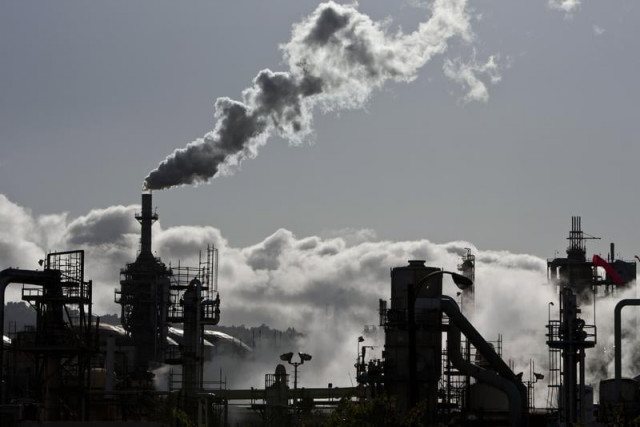Carbon emissions in Pakistan likely to rise about 300% by 2030
Country needs to secure funds, take implementation of Paris Agreement seriously

Carbon emissions in Pakistan likely to rise about 300% by 2030
At the CoP 21 (conference of the parties), the member countries pledged to restrict the rise in temperature well below two-degree Celsius compared to pre-industrial times and even reduce it to 1.5-degree Celsius.
The 5th Intergovernmental Panel on Climate Change (IPCC) assessment report suggests that the cumulative carbon budget should not exceed 1,000 gigatons, if we want to keep the rise in global temperature below two degrees.
About 65% of the cumulative carbon budget has already been used since 1750. In view of current emission levels, we may end up exhausting this budget by 2045. This will lead to increase in average global temperature beyond three degrees by 2100, which will have far-reaching implications.
Pakistan’s contribution to global emissions is less than 1% while it is among the most vulnerable countries facing threat of climate change. According to the German Watch Global Climate Risk Index (2018), Pakistan is at the seventh position with a death toll of 523.1 lives per year - ie loss of 10,462 lives in 20 years - and economic losses worth $3.8 billion.
During this time, Pakistan has suffered from 141 extreme weather events (cyclones, storms, floods, glacial lake outburst floods (GLOFs), heat waves, etc). These recurring events affect Pakistan’s economy by destroying infrastructure and altering cropping patterns, which also have implications for food security on many agrarian hotspots in the country.
The country’s emission trend reveals that energy and agriculture sectors are responsible for 90% of its total greenhouse gas emissions. According to the Intended Nationally Determined Contribution (INDC), Pakistan’s total greenhouse gas emissions have increased by 123% in 21 years (1994 to 2015).
In light of GDP growth targets set in vision 2025 and the China-Pakistan Economic Corridor’s (CPEC) investment, infrastructure development and energy demand, the country’s total emissions are expected to increase by about 300% for the projected period (2015-2030).
Such statistics give countries such as Pakistan cause to take implementation of the Paris Agreement very seriously. Its implementation requires that all relevant stakeholders (countries and other actors) should work individually and collectively to adopt policies and mobilise resources that help advance action on climate change.
In this respect, developing countries, owing to their limited capacity, require support (financial, technological and institutional) to implement mitigation and adaptation actions and address climate change in a just and holistic manner.
Financial constraints
In line with the Paris Agreement commitments and compliance mechanism at the country level, Pakistan needs to remain determined to reduce emissions to the maximum extent possible. However, we do understand that financial and technical constraints may hinder the realisation of full mitigation potential.
It is likely that these challenges will continue to feature prominently in future national discourse and would only be effectively addressed with financial grants and technical assistance from the international community. If Pakistan intends to reduce up to 20% of its projected greenhouse gas emissions for 2030, the total abatement cost amounts to about $40 billion at the current price.
The Ministry of Climate Change acts as the focal agency in Pakistan for preparation, update, coordination, implementation and supervision of the Pakistan-INDC. A high-powered body comprising key stakeholders from the national government, sub-national governments and private sector steers the process.
This institutional arrangement would continue, leading up to the review and revision of Pakistan-INDC and its implementation during the period 2016-30. This institutional arrangement will also help improve national development planning processes.
At the same time, the ministry may continue to look into ways to make such institutional arrangements both inclusive and participatory and compliant with climate-related and other Sustainable Development Goals (SDGs) with the sharing of costs and resources.
So far, Pakistan has managed to access three funds under the UNFCCC to support its adaptation efforts which include the Special Climate Change Fund, Adaptation Fund and the Green Climate Fund. However, the cumulative amount is much less than what is required to take appropriate measures.
By improving institutional capacity and putting proper fiduciary standards in place, Pakistan can leverage a bigger pool of climate funds from multilateral institutions. It can also benefit from increased international access to affordable low carbon technologies, especially given its development needs and priorities.
The allocation for climate change adaptation by Pakistan itself seems very low as in the 2015-16 budget, it was only Rs39 million and in 2017-18, it was Rs815 million. There are poor allocations at provincial levels. The federal government expects to get a few international grants to be able to adapt to climate change. The Senate passed a law in 2017, which called for the creation of Pakistan Climate Change Authority to manage the funds.
Furthermore, climate legislation and policy frameworks at national and local levels have been introduced to address climate change issues and integrate climate considerations into development planning. Private sector can play a role in the realisation of SDGs in order to achieve the goal of sustainable economic growth.
To better align public-private partnerships for sustainable development, the SDG Fund has established the Private Sector Advisory Group, formed by business leaders of major companies from various industries worldwide. There is a need to connect our private sector to this UN-led mechanism to get it involved in achieving the SDGs.
The writers are associated with the Sustainable Development Policy Institute as researchers
Published in The Express Tribune, December 31st, 2018.
Like Business on Facebook, follow @TribuneBiz on Twitter to stay informed and join in the conversation.


















COMMENTS
Comments are moderated and generally will be posted if they are on-topic and not abusive.
For more information, please see our Comments FAQ